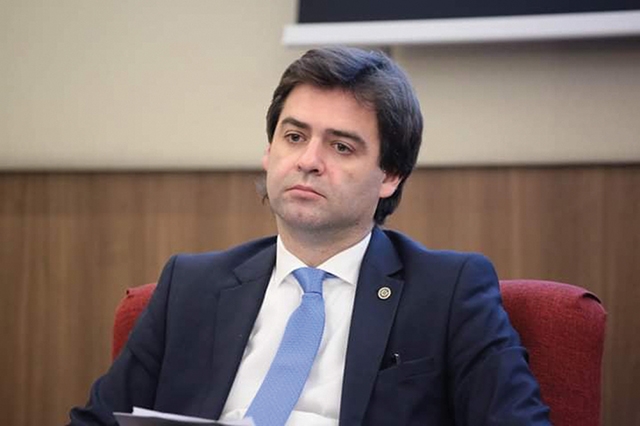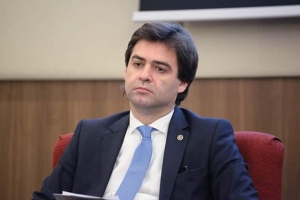Moldova's Former MFA on Moldova’s New President-Elect & Relations with Russia
Interview
By electing Maia Sandu and refusing Kremlin-linked Igor Dodon another term, Moldova seems to have made yet another stride towards the West. Sandu and her team have lofty goals, chief among them being getting rid of the country's rampant corruption and moving even closer to the EU. But does that fit in with the Kremlin’s plans? What are the red lines for Chisinau in their declared normalization of relations with Moscow? Moldova's Former Minister of Foreign Affairs, Nicu Popescu, spoke to the the Georgian Institute for Security Policy about this and more.
How much of a role did geopolitics, especially Igor Dodon’s Russian links, play in elections?
In Moldova, you have an electorate that is divided geopolitically, but to a large degree this geopolitical division is not always very strong. I think you have a roughly 40% cluster that is traditionally rather pro-Western, but most of them are not very anti-Russian, and you have the same on the other end of the spectrum, about 35%, who are Russia-friendly but who are not necessarily very anti-Western. And then you have centrist voters who sometimes decide the outcome of elections. What helped Maia Sandu make the leap from her stable electoral basis was to to run a campaign mostly centered on an anti-corruption message, and she also made an explicit effort to reach out to the Russian-speaking population and to more centrist voters. Her message on foreign policy was that she wants to bring Moldova closer to the European Union, but she wants respectful relations with Russia and at no point did she attack or criticize Russia, which enabled her to reach out to completely new voters, which also partly explains her much bigger victory, even over that of any other center-right candidate in Moldova.
Moscow sent a somewhat cordial congratulatory message, and even Zhirinovsky started praising Sandu and blasting Dodon. Does it mean that Russia is happy with how things played out in Moldova?
What to make of it? We should acknowledge that periods of attitudes to Moscow and Russia in Moldova are somewhat calmer and quieter than they would be in Ukraine or Georgia, not least because the active phase of the war in Transnistria, where Russia played a major supporting role in helping the Transnistrian separatism, ended in 92, and time has certainly calmed emotions on both sides. Moldova also has a somewhat different geography: it is somewhat further removed geographically from Russia, and in cultural terms we are also much less linked to the Russian language space. So, in this sense, I think the issue is less emotional for Russia; there is some potential for a calm relationship. Now we’ll see where this leads. At least from the Moldovan side, there is a strong desire not to complicate matters if this can be avoided, but at the same time to do so from a position where Moldovan sovereignty and self-respect is maintained.
The presidential office itself is very limited, largely ceremonial. Unless you follow with a victory in the parliamentary elections, should we have high expectations for Sandu to actually achieve anything?
We should have moderate but positive expectations. Moldova is a semi-parliamentary republic which gives the president some powers to block certain negative developments, be it in keeping corrupt in positions or appointing corrupt judges: the president has a certain platform through which they can exercise institutional power, and a capacity to filter and control and limit some negative trends. Of course, it also gives you a political platform to raise issues, and the president also has some powers in the national security council, in some of the law enforcement agencies. Politics doesn't work according to a mathematical form, but it also depends on momentum, on emotions, on public opinion pressure, and of course here, Sandu has a lot of momentum with her anti-corruption agenda. There’s a lot of momentum in trying to reconnect Moldova more closely with the rest of Europe, and a lot of public expectation that the political class will be less corrupt.
How will Sandu bring Moldova closer to Europe, including EU membership, which was also one of your declared ambitions during your tenure as Minister?
If we’re pragmatic and we look at the next several years, possibly decade, then the conversation about membership remains very theoretical while countries like Moldova, like Ukraine, like Georgia, still have major governance issues, be it on corruption, be it on political pluralism, be it on the quality of elections. In a strict Moldovan context, Moldova is one of the most corrupt countries in Europe, among most countries in the world; it is much more corrupt than Georgia, and if Moldova doesn't radically improve its corruption situation, of course any talk about EU membership will not remain credible. I don't like these sort of philosophical conversations about whether it will happen at some point in 50 years or 30 years; this is all very speculative. What is not speculative is that Moldova has to do its homework. Like in the Olympic games: you can’t come and hope that you will win a medal if you haven’t trained day and night to become strong. I see the EU accession process from the same prism.
In sports, external factors can affect your performance, like injuries. What is Moldova’s potential limiting factor in its aspiration to become an EU member country?
Luck and context play a role in politics, but if you're not well trained, luck won’t help you. We know from recent history that windows of opportunity open and close, but you can only jump through a window of opportunity if you're fit. Let's imagine that at some point there is a geopolitical context that makes it favorable to join, and if you're not ready, you're not joining. Look at the Balkans. The Balkans were offered a membership accession promise 20 years ago and some joined the EU: Slovenia, Croatia, but some others have not progressed very much towards the EU, so a promise is not enough.
Remembering 2008 in Georgia, 2014 in Ukraine and, according to yourself, 2020 in Armenia, all examples of Russia opposing its neighbors’ Western aspirations, do you see something like this happening to Moldova if you try too hard to go West?
The honest answer is that we don't know, but we have to try. Moldova, when it comes to domestic reform, has a lot of training to do. I would say there are several things that make Moldova somewhat different: Moldova has been neutral since 1994, and there is no parallel NATO accession aspiration to that of the EU. Most of the population in the political class does not support NATO accession. That removes one of the massive Kremlin concerns that might derail some geopolitical trends around Moldova. Next, to a large degree, Moldova's geography in terms of allowing it to have more geopolitical space to maneuver, including vis-à-vis Russia, is greater than for countries like Armenia or Belarus, and possibly even Ukraine. Moldova doesn’t have a border with Russia, meaning a different capacity to project military power, meaning different trade links. This puts Moldova in a slightly more comfortable geopolitical context than Georgia, Armenia or Ukraine.
Has the neutrality notion worked in your benefit, or has it impaired you? How can it be feasible for a country that is neither financially or militarily strong enough to defend itself?
The reason Moldova is neutral, and has been since 1994 when we adopted the constitution, is the hope that this would give moldova an argument to insist and persuade Russia to remove its troops from the Transnistrian region, and I confess those hopes which were tied to Moldovan neutrality have not been accomplished. Russian groups still remain on the ground, and neutrality has not helped. At the same time, it did help Moldova avoid other geopolitical tensions related to NATO accession that Georgia and uUraine had. I think the balance of that is mixed, but what I also think is worth underlining is that Georgia has tried different strategies, joining the Tashkent Treaty around 1995, a Russian-led military alliance which later became the Collective Security Treaty Organization in the hopes it would help stop Abkhazia and South Ossetia. And being a Russian military ally and legitimizing four Russian military bases on Georgian soil in the late 90s also didn't help Georgia solve this problem. So, in this sense, I think that neutrality was not perfectly efficient, but we see now that Armenia, a Russian ally, did not receive sufficient Russian support. States have tried to align with Russia, to be neutral with Russia, or to be critical towards Russia but in all cases none of them achieved their objective.
During your time as a Minister of Foreign Affairs, you called for the normalization of Moldova's relations with Russia. A similar statement was issued by the current Georgian government. What does this normalization entail, and how much say would Moldova have?
It’s a word that can mean different things in different countries; in the Moldovan context, it meant that Moldova wants to have a stable relationship with Russia; wants to trade more with Russia, but wants this relationship to be based on mutual respect. This does not imply geopolitical concessions to Russia.
By Vazha Tavberidze













